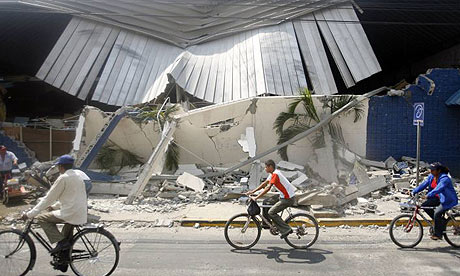Reducing Risk on the Honduran Riverbanks
The people living on the banks of the Ulúa and Humuya rivers have long faced high risks due to weak reaction capacities at both community and institutional levels. As a result, these vulnerable floodplain communities have oftentimes seen their houses flooded, their crops damaged or their livestock lost, as well as losing access to drinking water for extended periods of time. A general lack of infrastructure in the region has further isolated these communities, and public authorities have typically struggled to make sufficient emergency shelter and rapid medical care available to the victims of recurring disasters.

In 2013, the Finnish Red Cross, in partnership with the Honduran Red Cross, the German Red Cross and the Italian Red Cross, supported 12 communities in the Department of Yoro in northern Honduras to prepare for natural disasters, such as floods and landslides. With the financial support of the European Commission’s Department for Humanitarian Aid & Civil Protection (ECHO) and the Finnish Ministry for Foreign Affairs, project partners developed public evacuation plans, carried out drills and first-aid training, and supplied emergency kits to schools and health centres on the floodplain banks of the Ulúa and Humaya rivers. Importantly, stronger ties between communities, Municipalities and the institutions (such as hospitals and schools) were established to reduce response times and harmonise coordination, improving collective capacities to deal with emergency situations quickly and efficiently.
The El Progreso Penitentiary Centre, a prison in Yoro, was a classic example of a particularly vulnerable structure, with an over-capacity population and a faulty electrical system that could easily cause fires. The prison itself had been flooded or damaged by earthquakes several times, and there were no efficient or safe evacuation routes available for the inmates to use in case of a disaster.
As part of this project, the Red Cross helped to set up a Committee for Emergencies in the prison. A total of 385 prison inmates and staff were trained and empowered to jointly take action in risk reduction and disaster response. The testimony of Marco Vinio Castro, one of nearly 400 inmates at El Progreso Penitentiary Centre, demonstrates the strong practical impact of the project’s activities.

"I have learnt how to prevent blood loss, how to stabilise a bone fracture, how to treat wounds and burns, and how to respond to someone who is in cardiac arrest or has been poisoned. I would like to see the program grow at El Progreso. The training has opened up new hopes for me […] It changes our minds because it allows us to see life differently. If before we used to cause pain, now, the ones that have received this training, we feel the wish to help others instead of hurting others,” he explained.
Basic information
Country
Honduras
Duration
2013
Partners
Finnish Red Cross, Honduran Red Cross, German Red Cross, Italian Red Cross
This project was supported financially by ECHO’s Disaster Preparedness programme (DIPECHO) – the core element of ECHO’s global Disaster Risk Reduction efforts since its launch in 1996. The programme aims to increase resilience and reduce vulnerability by helping communities at risk of disasters to better prepare themselves by undertaking training, establishing or improving local early warning systems and contingency planning.

